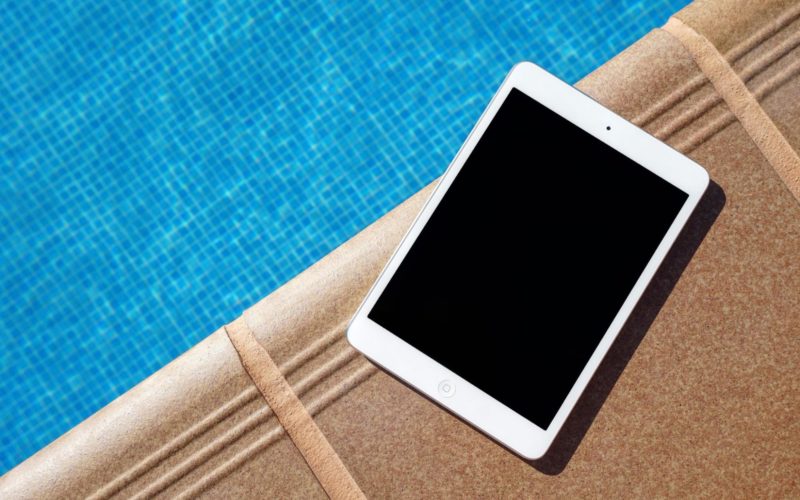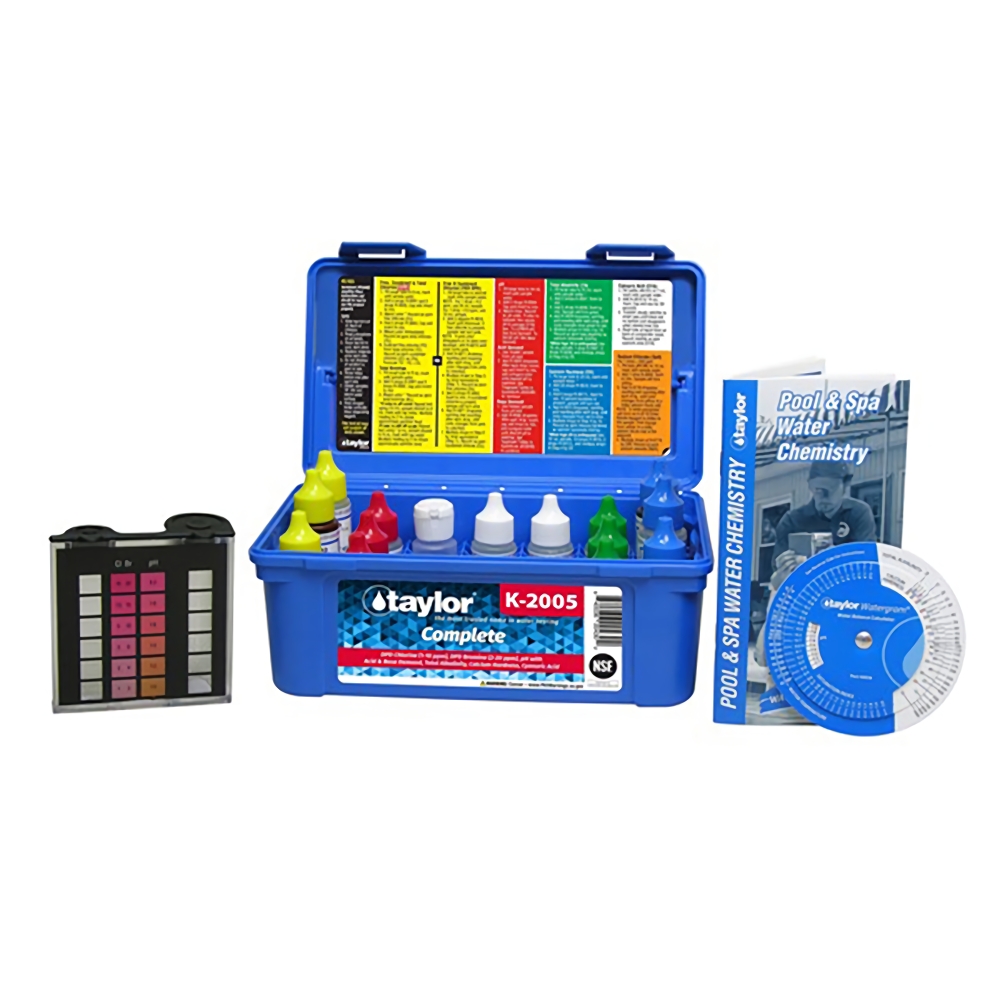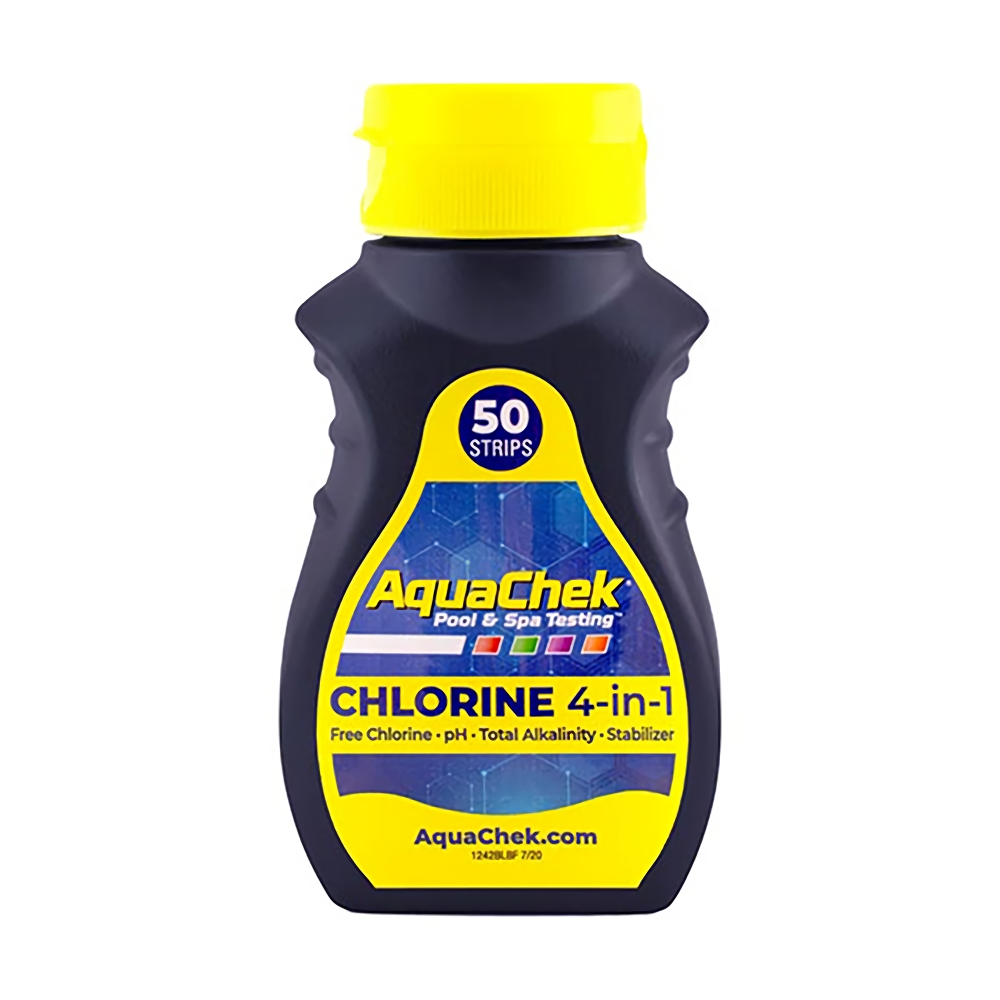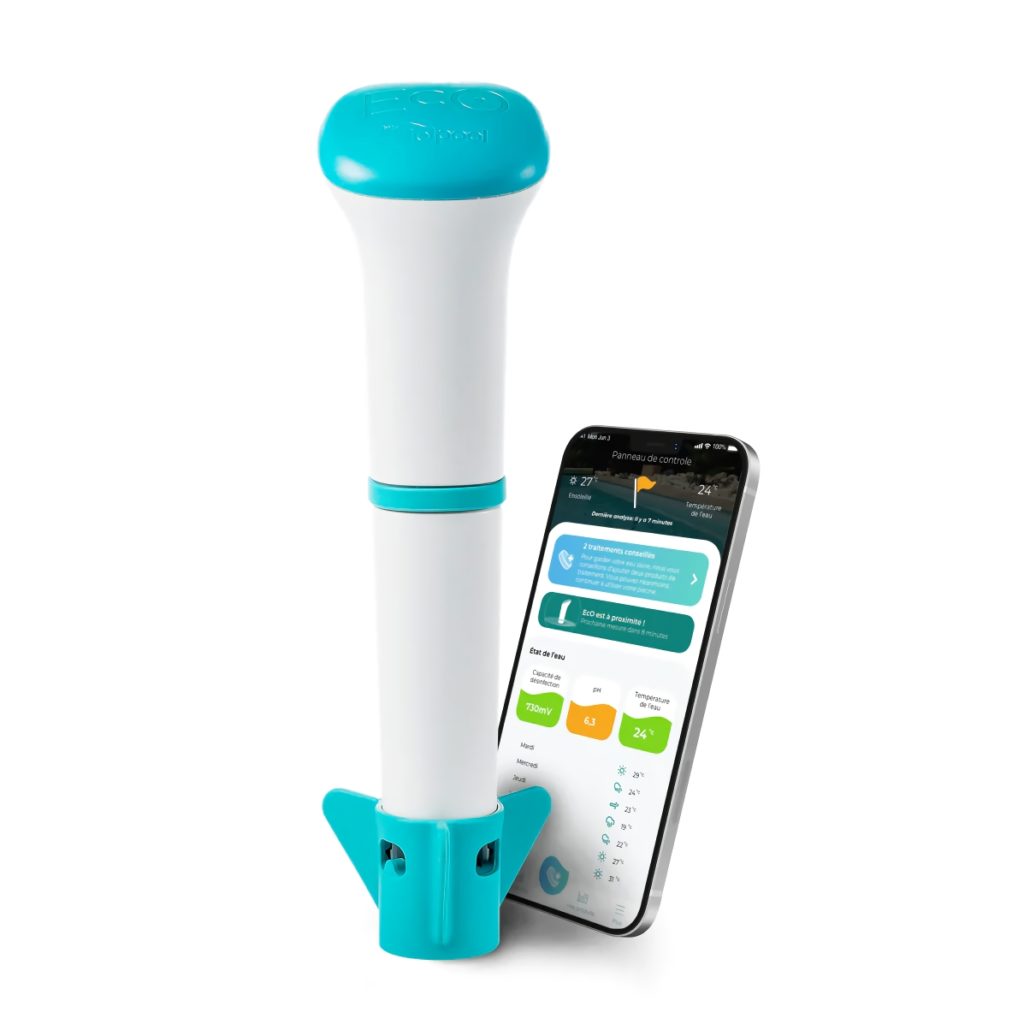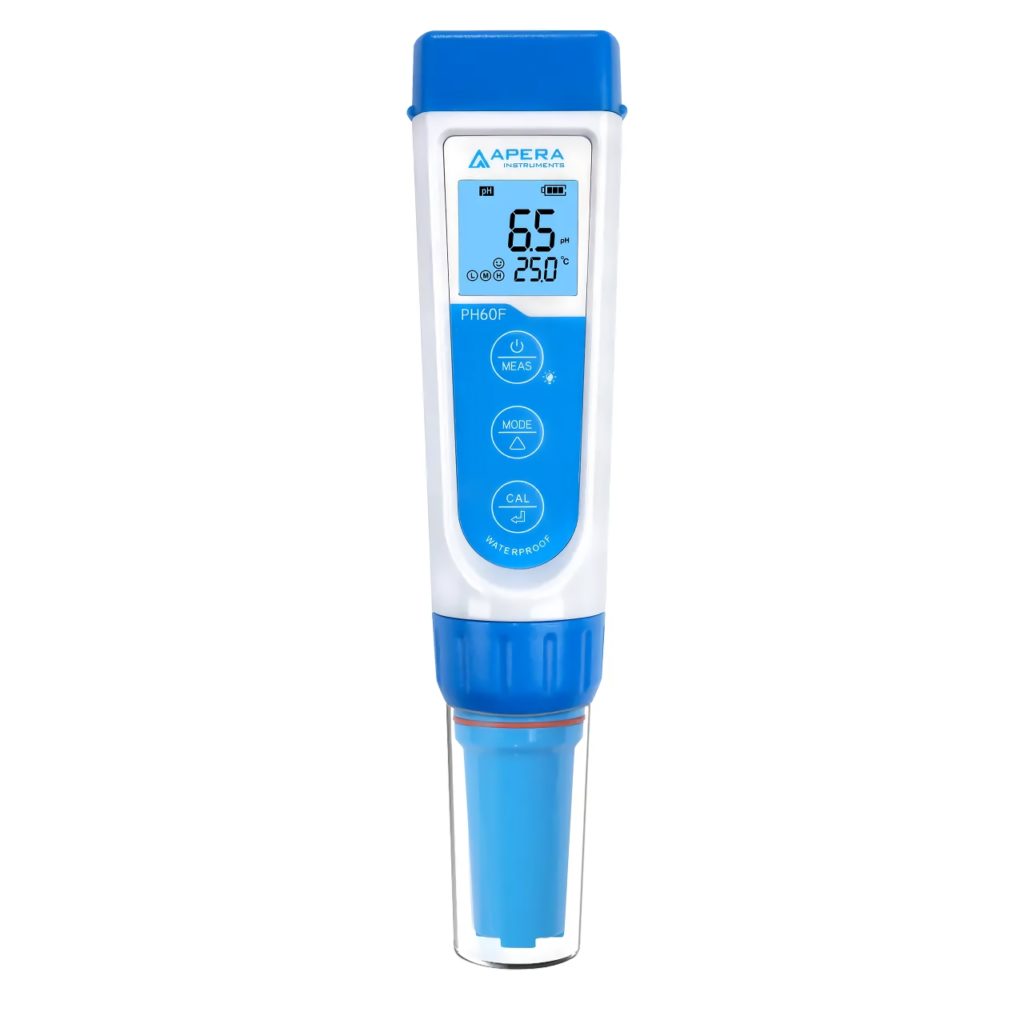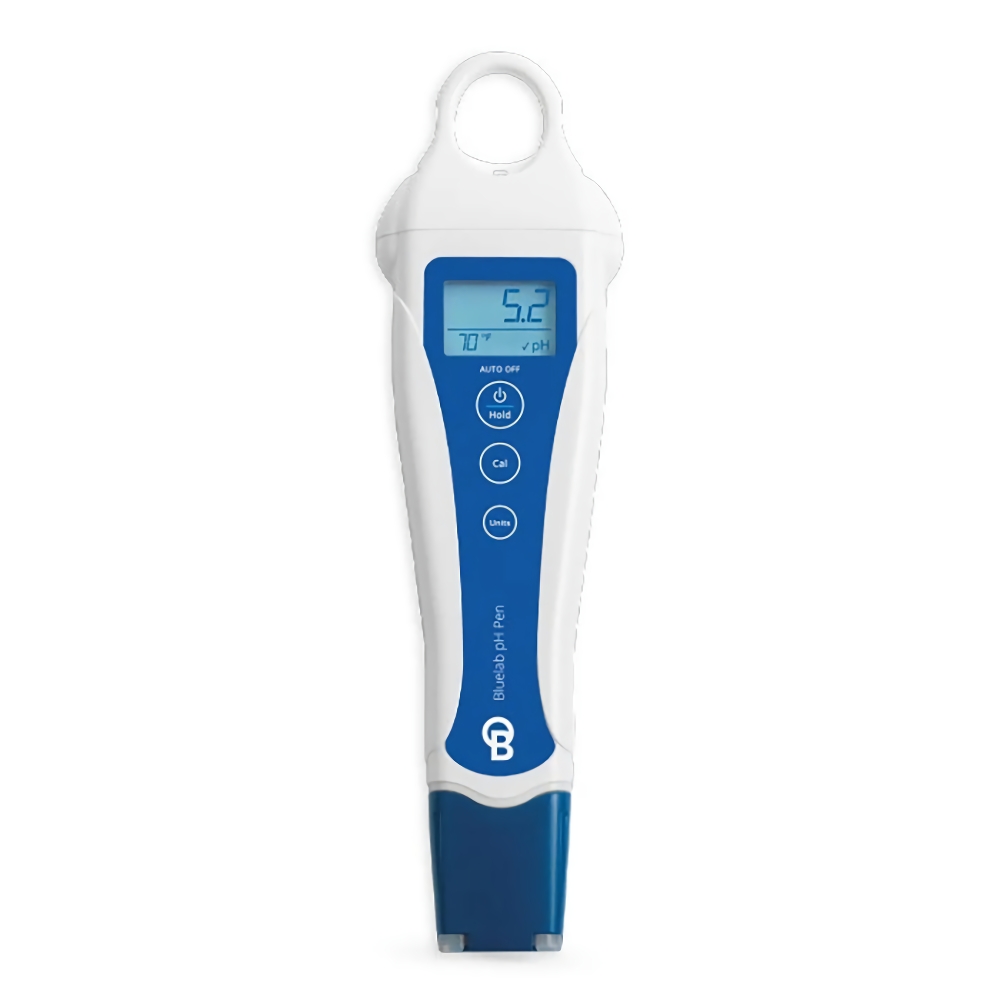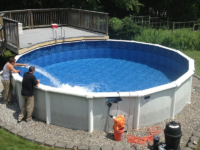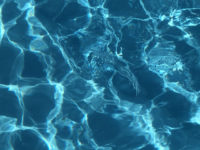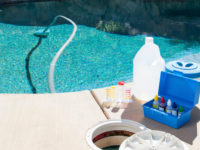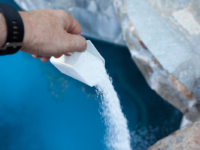Diving into the cool waters of a pool on a hot summer day sounds refreshing and enjoyable, but few realize the time-consuming efforts required to keep the water safe and clean. Pool owners are often faced with the challenge of maintaining water quality, balancing chemicals, and more. However, a game-changing solution has emerged in the form of pool monitoring systems that offer a glimpse into the future of pool maintenance.
In this article we will present the 5 best pool monitoring systems, offering insights into the best digital and manual water monitoring systems available, ensuring a clean, safe, and hassle-free swimming experience.
5 Best Pool Chemical Monitors Comparison Table
Our team has researched and selected the best pool monitoring systems to help you choose the most effective products for your needs. After analyzing hundreds of products based on availability, a rating above 4.0 on Amazon, and reviews (over 500 reviews analyzed), we’re ready to present to you our top picks in various categories.
You will see not only the best smart pool monitoring systems but also their top-quality manual alternatives.
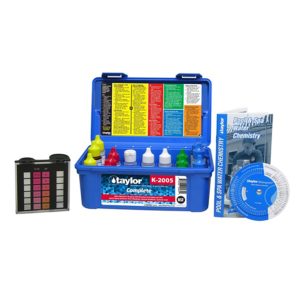 Taylor Pool & Spa Test Kit | Winner category: the most accurate testing kit Benefits: - Trusted by pool service professionals - Has more metrics than any other system on the list - Durable and portable, making it suitable for both home and commercial pool maintenance - Makes you feel like the main character from Breaking Bad Jump to the detailed review |
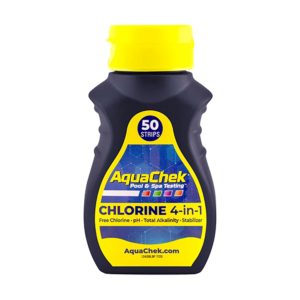 AquaCheck Chlorine 4-In-1 | Winner category: the best test strips Benefits: - A great choice for beginners - Shows results within 30 seconds - No additional reagents are needed, simplifying the testing process - Just enough strips for a season Jump to the detailed review |
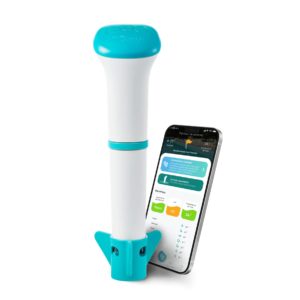 Iopool EcO Smart Water Monitor | Winner category: the best smart system Benefits: - Continuous pool monitoring in real-time - Automated alerts and recommendations - Saves data to the cloud service - 2-year warranty Jump to the detailed review |
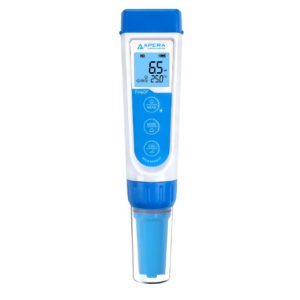 Apera Pocket Tester Kit | Winner category: best for measuring pH levels Benefits: - Provides the most accurate measurement of pH - Includes an auto-calibration feature - Comes with replaceable probes, allowing users to extend the lifespan - Easy to carry around Jump to the detailed review |
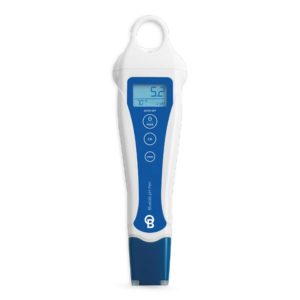 Bluelab Pen-Digital Tester | Winner category: the most versatile Benefits: - Excellent choice for both pools and garden enthusiasts due to its useful properties for - Easy to read even in low-light conditions - Can measure and in addition to pH - Waterproof Jump to the detailed review |
What Is a Pool Monitoring System & Why Bother?
A pool monitoring system is a device that provides real-time information and insights about the pool’s water quality. With these systems, pool owners can automate water chemistry monitoring and analysis, saving time from frequent visits to pool stores and eliminating guesswork.
Daily or weekly, these tools make it easy to maintain your pool, spa, or hot tub. They collect data and forward it to a website profile or a mobile app for easy access and analysis.
Those gadgets use various sensors to measure essential water chemistry parameters like:
- pH levels
- Free chlorine or bromine concentrations
- Total chlorine or bromine levels
- Alkalinity
- Temperature
And in some cases, they can read additional measurements like total dissolved solids (TDS), oxidation-reduction potential (ORP), or conductivity.
Choosing The Best Pool Monitoring System For Your Needs
There are several types of monitoring systems, each designed to meet different needs and environments. Here are the most common water-monitoring systems:
- Smart Systems
Digital water monitoring systems include both handheld measuring devices and fully automatic systems. Smart pool monitor devices are very convenient and easy to use, but they are not yet widely used and therefore their quality is not yet that high. Also, their functionality is not that extensive for now. Ideally, in the long term, they can optimize water quality, reduce maintenance costs, and improve overall safety for your pool.
Today, however, they are good enough to keep track of your pool daily, especially if you’re often away. For example, with the Iopool EcO Smart Water Monitor (review), it’s very convenient to check the status of your pool through the app, and text your friend asking him to add chlorine to the water.
- Manual systems
It’s never a bad idea to have a manual system on hand, such as pool testing strips or testing kits. The kits require time and some knowledge to measure for max precision. But many are quite popular with pool professionals, such as the Taylor Pool & Spa Test Kit (review), so there can be no doubt about the quality.
As for the strips, they have a wider range of applications, such as hot tubs. Some of them may have numerous parameters, like “7-in-1,” but it’s easy to get confused with them, and their accuracy is questionable. In our research, we’ve learned that it’s much better to have standard strips for measuring pH, alkaline, and chlorine levels, and a separate set of strips for other metrics, such as or salt.
- Automated Chemical Dispensing Systems
These aren’t really considered automatic pool chemical monitoring systems, but they’re no less useful for your pool. This category mostly includes chlorinators.
Although smart pool monitors have become increasingly popular in recent years, as demand for advanced pool maintenance solutions has risen, some are lacking in functionality. You wouldn’t want to waste time and money on a simple floating thermometer or cheap handheld devices, would you?
Pool owners who value themselves and their time must be aware of the risks associated with choosing cheaper, low-quality products, and instead opt for reliable and reputable brands that prioritize accuracy and performance for effective pool water monitoring and management.
Detailed Review
Taylor Pool & Spa Test Kit — The Most Accurate Testing Kit
The most accurate testing kit
Pros
- Has the widest range of testing capabilities among other systems, including pH, chlorine, , , , sodium chloride, etc
- Provides reliable results that guarantee precision for continuous maintenance and specialized treatments
- Can be used for in-ground pools, above-ground pools, hot tubs, and spas
- Durable and long-lasting construction
- Trusted by pool professionals
Cons
- Takes time to master all the instructions
- Can be difficult to use for beginners (but you can read our guide on how to use a test kit)
If you’re looking for the highest quality pool water monitoring system and the widest range of statistics, we recommend getting a Taylor K-2005 Testing Kit. Taylor’s kits are widely recognized and respected among pool and spa professionals. It allows you to test a myriad of water chemistry parameters, including free and total chlorine, bromine, pH, alkalinity, hardness, and .
The K-2005 Test Kit uses a color-matching () method, which involves adding reagents drop by drop until the water sample changes color, indicating the presence or concentration of a particular parameter. The test kit comes in a sturdy case, which helps protect the solutions from damage and extends their lifespan.
The K-2005 model is a pool chlorine monitor for regular pools, which means it’s not suited for saltwater pools. But that doesn’t mean this brand hasn’t taken this need into account (otherwise they wouldn’t be called professionals). So for that case, we recommend Taylor’s kit for saltwater pools.
Since this brand positions its products for pool experts, it’s not surprising that many beginners in pool care may be overwhelmed with mastering this particular kit. And since our goal is to share quality systems available to all pool owners, regardless of their expertise, we advise beginners to try a PoolMaster’s kit first. It may not have as many features as its predecessor, but it is no less in quality and has many good reviews.
AquaCheck Chlorine 4-In-1 — The Best Test Strips
The best test strips
Pros
- Accurate result readings in a matter of seconds
- Easiest to use on our list; all you have to do is dip the strip in water
- Offers only 4 metrics, but their accuracy is much better than that of 7-in-1 brands
- 50 tapes that will last for a whole season
- No additional equipment is required for reading (but you can get a digital alternative for convenient readings, check out the review below!)
Cons
- You must be fast with reading in a span of 15 to 30 seconds (check the review below to see why)
- Not durable, therefore you must not store them in a humid area
For those who are new to pool testing, the AquaChek Chlorine 4-in-1 is a great choice. These test strips offer a quick and convenient way to monitor key water chemistry parameters in swimming pools and spas: free chlorine, total chlorine, pH, and total alkalinity. It doesn’t take up much space and is much easier to use than Taylor’s kit (review).
Such strips employ a color-matching system, where users compare the colors on the strip against a provided color chart to determine the concentration of each parameter. While this method offers a quick visual representation of the water’s condition, color reading may be a challenge for some users. AquaCheck has taken care of its customers in advance and offers the possibility to measure water chemistry with AquaCheck TrueTest strips along with a digital reader made for them (sold separately).
Simply dip the test strip into the pool or hot tub water for a second, and within a few moments you will have fast, accurate results. However, sometimes the use of strips is a race against time. You need to do the reading between 15 and 30 seconds after wetting it; after that the strips begin to lose their properties, and the result will not be as accurate.
Therefore, to be sure of the results and to prevent unnecessary rush, you can take a picture of the test results and use the AquaChek Smart App (available on Google Play and App Store). This app will not only help you read the test results but will also give you recommendations on how to care for your pool.
Iopool EcO Smart Water Monitor — The Best Smart System
The best smart system
Pros
- Provides continuous, real-time monitoring, surpassing traditional manual tests that offer only periodic insights
- Automated recommendations based on long-term data monitoring, offering insights that go beyond one-time readings
- Remote access through the free, user-friendly app, which is perfect for checking pool water quality while away from home
- The best option among smart digital pool monitoring systems
Cons
- Not compatible with saltwater pools
- Occasionally requires manual testing for calibration
The previous two products were the best representatives among manual monitoring systems. But the Iopool EcO Smart Water Monitor is a full-fledged smart pool chemical monitor.
One of the standout benefits of this device is its ability to track changes in pH levels, , and temperature, and share data via smartphone app in real-time, which is much more convenient than our manual predecessors, Taylor (review) and AquaCheck (review). With a dedicated app that provides you with historical data analysis of your pool and offers personalized recommendations, you can stay informed about your pool’s health anywhere, anytime.
While this smart pool monitor boasts impressive features, some users may find that it lacks monitoring for additional water chemistry parameters beyond pH and free chlorine, plus it’s not compatible with salt pools. For those requiring a more extensive water analysis, additional testing equipment may be needed.
Apera Pocket Tester — Best For Measuring pH Levels
Best for measuring pH levels
Pros
- Excels at measuring pH, but can also provide readings of and temperature
- With both automatic and manual calibration, offers more calibration flexibility than standard testers
- Featuring a replaceable pH probe that not only extends the lifespan of the device but also reduces long-term costs compared to testers with fixed electrodes
- Easy to carry and use on the go, a great option not only for pools but also for traveling
- Has a large screen for a clear and easily readable visual interface
The Apera Pocket Tester is a reliable and handy tool for pool owners seeking precise pH measurements. Its high level of accuracy ensures pool water is maintained at optimal pH levels, creating a safe and comfortable swimming environment. The user-friendly interface and auto-calibration feature makes it accessible to both novice and experienced pool operators, streamlining pool maintenance.
While the Apera Pocket Tester excels in pH testing, it does have some limitations. As a single-parameter tester, it doesn’t offer comprehensive water analysis, requiring additional equipment for monitoring other crucial pool chemistry parameters, although it can measure temperature and besides pH.
Overall, the Apera Pocket Tester is an excellent choice for those primarily concerned with pH levels in their pool. This device provides the best of both worlds, combining both manual testing features like the AquaCheck (review) and digital technology like the Iopool (review). Its compact size and accuracy make it a valuable tool for anyone seeking precise and straightforward pH testing. Pool owners who desire a portable and easy-to-use device for on-the-spot pH measurements will find the Apera Pocket Tester to be a reliable companion in their pool maintenance journey.
Bluelab Pen-Digital Tester — The Most Versatile
The most versatile
Pros
- Due to its ability to read pH, temperature, and conductivity, this device is quite useful not only for pools, but is also quite popular among hydroponic gardening enthusiasts
- Offers automatic temperature compensation for convenient readings at any season
- A reduces the likelihood of clogging or fouling, which can extend its lifespan and reduce the need for frequent recalibration or replacement
- Durable and water-resistant construction
Cons
- The probe must be soaked in solution when not used, which complicates its storage and makes it impossible to take it, for example, on trips
- KCL solution is sold separately
- Higher price points compared to basic pH testers, which may be a consideration for budget-conscious pool owners
The Bluelab Pen-Digital Tester, made in New Zealand, is a versatile and indispensable tool for pool owners and hydroponic enthusiasts alike. It has slightly different features than the Apera tester (review), with its ability to measure pH, conductivity, and temperature in one device, making it perfect for maintaining optimal water conditions in both pools and hydroponic systems. The accuracy of its digital readings ensures precise adjustments to water chemistry, optimizing plant growth and swimmer comfort.
With its durable construction and water-resistant design, it’s suitable for various pool environments, from residential pools to commercial facilities. However, potential buyers should consider the higher price point compared to basic pH testers and the need for occasional recalibration. The Bluelab Pen-Digital Tester is best suited for pool owners who desire a reliable and all-in-one testing solution, providing peace of mind and efficient pool maintenance in a single handheld device.
Why Don’t We Recommend Sutro Or WaterGuru?
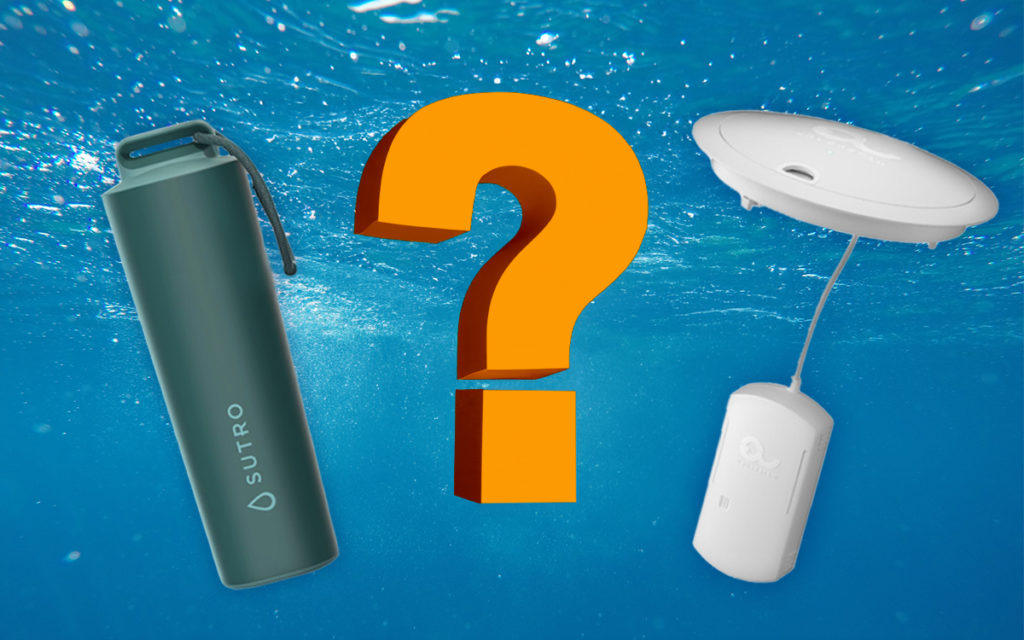
Although smart pool monitors like Sutro or WaterGuru are now among the most popular, they have a surprisingly low rating on Amazon and rather contradictory reviews. For example, for a higher cost, Sutro has the same measuring parameters as the Iopool EcO Smart Water Monitor (review), and they require a paid subscription for their app which only adds costs and reduces value. And WaterGuru’s customers often complain that it’s a short-lived device for its price, has problems connecting to the Internet, and consumes a lot of energy.
Just a few years ago, the best product on the market among the systems was the pHin monitor system. But, unfortunately, on December 20, 2021, they closed their business and disconnected their services. Do not buy this product, as it is now just nothing but scrap metal.
Summary
In this article, we dive into the topic of pool monitoring systems, their types, and how much they simplify pool maintenance. Our research team compiled for you a handy and informative comparison table, spotlighting the 5 best pool chemical monitoring systems on the market, and described the advantages of each of them with detailed reviews.
During the research process, we recognized the Iopool EcO Smart Water Monitor (review) as the best smart pool monitoring system, while the Taylor Pool & Spa Test Kit (review) is the leader among manual pool monitoring systems.
We hope this article has been helpful and that you’ve found all the answers you need about pool water monitoring systems. But no matter what type of system you choose for yourself, professional water testing always provides an extra layer of confidence, ensuring optimal pool health. It never hurts to double-check your water in your local pool store once in a while.
FAQ
🔍 How accurate are pool monitoring systems?
Pool monitoring systems are fundamentally designed to be accurate and reliable, providing precise measurements of water chemistry parameters to ensure proper pool maintenance and water quality.
🆚 What’s the difference between testing kits and strips?
The main difference between testing kits and strips is in the testing method: testing kits involve a titration process with liquid reagents, while testing strips use a color-matching system with reagent-impregnated paper strips.
🌊 Are pool monitor systems suitable for all types of pools?
Pool monitoring systems can be suitable for various types of pools, including residential pools, commercial pools, hot tubs, and spas, as they offer flexibility in their application and can adapt to different pool sizes and setups, like a Bluelab Pen-Digital Tester (review). However, not every system is compatible with salt pools.
⌛️ How often should I use pool chemistry monitors?
The frequency of using pool chemistry monitors can vary based on factors such as pool usage, weather conditions, and the level of monitoring required, but generally, regular testing at least once or twice a week is recommended for optimal pool maintenance.
🧪 How do I calibrate a pool monitor system?
Calibration should be performed regularly to maintain the system’s accuracy. When calibrating pool monitoring systems, be sure to follow the manufacturer’s instructions, which may include using calibration solutions of known values to adjust instrument readings and ensure accurate measurements.
